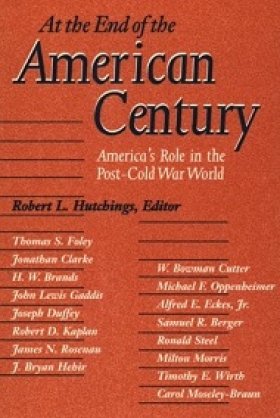At the End of the American Century: America's Role in the Post-Cold War World

-
“It was one thing,” writes editor Robert L. Hutchings in the introduction to the present volume, “to lead an alliance of Western democracies in a grand struggle against Soviet communism; quite another for the accumulated obligations of the forty years of Cold War confrontation to ensnare us in a continued international role against no certain foe toward no certain ends.” In At the End of the American Century, Hutchings brings together a distinguished group of authorities to review essential questions of morality, interest, politics, and economics in U.S. foreign policy after the collapse of the Soviet empire. The contributors—prominent legislators, foreign policy makers, scholars, and business leaders—offer a back-to-back basics inquiry: How much does morality, rather than self-interest, drive our foreign policy? How do we confront an anarchic world when our strategies have been developed for opposing singular, organized forces? What do we really want out of global trade, and do we know who our partners will be?
The contributors are Thomas S. Foley, Jonathan Clarke, H. W. Brands, John Lewis Gaddis, Joseph Duffey, Robert Kaplan, James Rosenau, Bryan Hehir, Bowman Cutter, Michael Oppenheimer, Alfred Eckes, Samuel Berger, Ronald Steel, Milton Morris, Timothy Wirth, and Carol Moseley-Braun.
Robert L. Hutchings was director for European affairs at the National Security Council in 1989–92 and special adviser to the secretary of state in 1992–93. He is now Assistant Dean for Academic Affairs at the Woodrow Wilson School of Public and International Affairs, Princeton University. He was awarded the Polish Order of Merit in recognition of his contribution to Poland's freedom and independence.
Editor
 Robert L. HutchingsDistinguished Fellow;
Robert L. HutchingsDistinguished Fellow;
Professor of Public Affairs and Walt and Elspeth Rostow Chair in National Security, Lyndon B. Johnson School of Public Affairs, University of Texas at AustinBrowse Insights & AnalysisExplore More
Browse Insights & Analysis
360° View of How Southeast Asia Can Attract More FDI in Chips and AI
Posted date/time:
A Case for a North American Common Tariff
Posted date/time:

